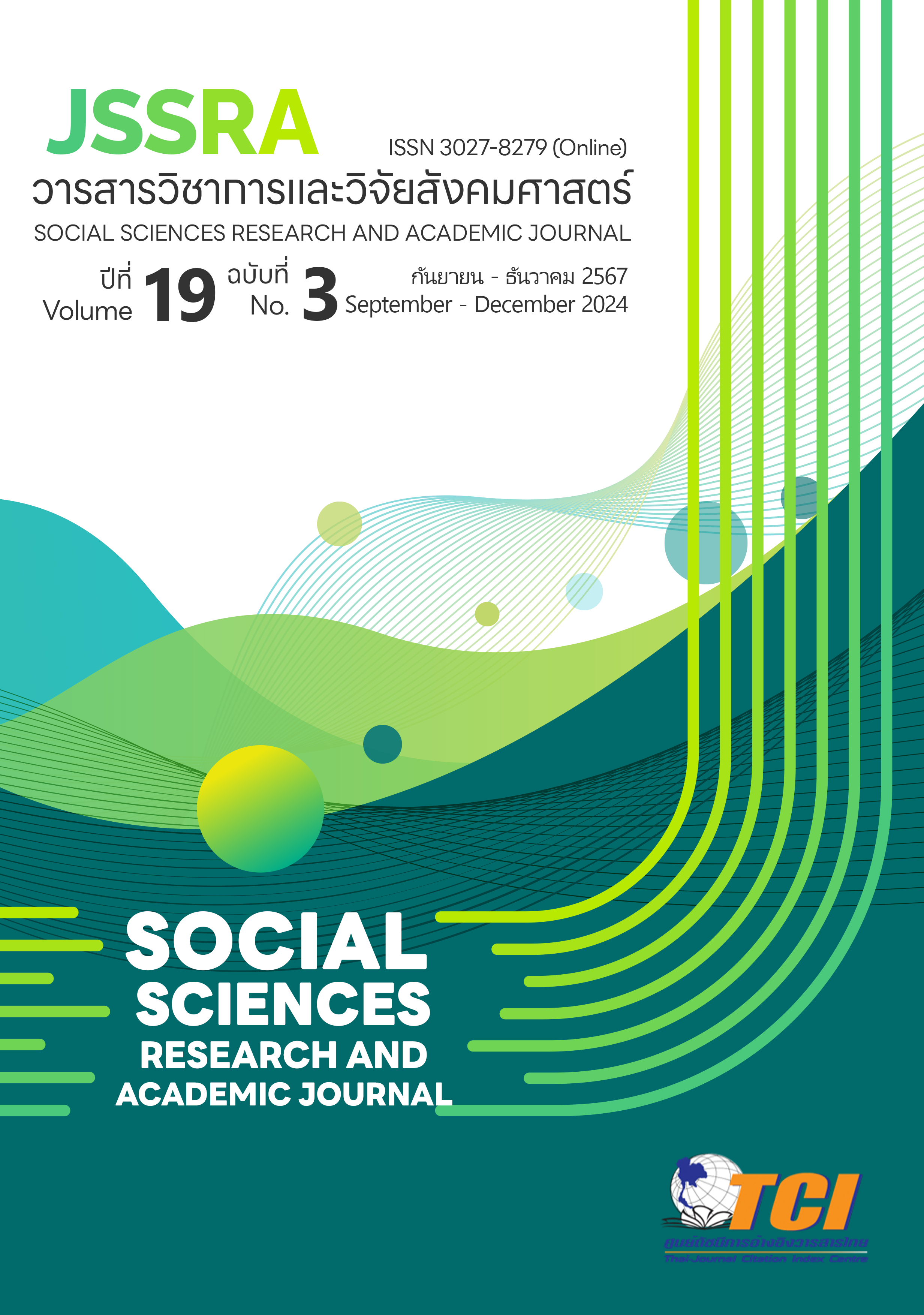The Development of Innovative Online Active Learning Management by Using the Theory of Constructivism and Flipped Classroom for Learning Competencies in the 21st Century of Students in Schools under the Secondary Educational Service Area Office Sakon Nakhon
Main Article Content
Abstract
The purposes of this research were to: 1) develop an innovative proactive online learning management by using self-knowledge building theory and inverted classroom concepts, 2) compare learning competencies in the 21st century before and after learning, 3) compare learning achievements before and after learning, and 4) study satisfaction in learning management. The sample groups used in this research were 35 students in schools under the Secondary Educational Service Area Office Sakon Nakhon were selected using a multi-stage random sampling method. The research tools in this research were 1) an innovative proactive online learning management using self-knowledge creation theory and inverted classroom concepts, 2) a learning management plan for biology subject content, 3) a learning competency assessment form in the 21st century, 4) an achievement test and 5) a satisfaction questionnaire. Data were analyzed by mean (x), standard deviation (S.D.), and t-test for Dependent Samples.
The research findings were as follows: 1.The key elements of the proactive online learning management innovation model by using self-knowledge building theory and flipped classroom concepts consisted of 7 components: 1) Background and importance, 2) Basic theory and concepts, 3) Objectives of learning management, 4) Learning process, 5) Social system, 6) Principle of interactive performance, and 7) Support system. 2. The students received learning management through innovative online learning management by using the theory of creating knowledge yourself and the flipped classroom concept was higher learning competencies in the 21st century after studying than before studying. and higher academic achievement after studying than before studying. 3. The level of satisfactory of students in learning achievement proactive online knowledge by using the theory of creating knowledge by oneself and the classroom concept of the total mean was 4.38 at a high level.
Article Details
References
Bergmann, G. and Sams, S. (2013). Flip Your Classroom Reach Every Student in Every Class Every Day. Colorado: Colorado Publishing.
Chiang Rai Teacher. (2020). Using the Microsoft Teams Program for Organizing Online Teaching. Retrieved May 4, 2021, from https://www.kruchiangrai.net/2020/04/05/
Joyce B., Weil, M. and Calhoun, E. (2011). Models of Teaching. Boston: Pearson Education.
Khaemmanee, T. (2011). Pedagogical Science: Knowledge for Organizing Effective Learning Processes. Bangkok: Chulalongkorn University Press.
Matthews D. & Schrum L. (2003). High-Speed Internet Use and Academic Gratifications in the College Residence. Internet and Higher Education Journal, 6(2), 125-144.
Maytwin P. (2018). 21st Century Skill: Skills of the 21st Century. Retrieved October 21, 2018, from https://www.nectec.or.th/news/news-pr-news/21st-centuryskills.html.
Ministry of Education. (2008). Basic Education Core Curriculum 2008. Bangkok: Agricultural Cooperative Assembly of Thailand.
Ministry of Education. (2012). Ministry of Education's Education Development Plan No. 11 (2012-2016). Bangkok: Author.
Mourasri, C. (2013). Academic Outcomes using a Reverse Teaching Method Combined with the Classroom Inverted on Top of Social Networks in the Course of Analysis and Problem Solving for Students in Grade 5. Master of Industrial Education (Computer Education). King Mongkut's University of Technology Thonburi, Bangkok.
Noppharat P. (2013). E-learning. A New Choice of Education. Retrieved January 15, 2022, from http://www.e-learning.dss.go.th
Panich, W. (2012). Sending Happiness to Quality Education 2013. Bangkok: Institute of Management Promotion. Knowledge for society.
Panich, W. (2013A). What is a Flipped Classroom Like? Teachers for Students Create A Flipped Classroom. (2nd ed.). Bangkok: S.R. Printing Mass Products.
Panich, W. (2013B). Teachers for Students Create A Flipped Classroom. (2nd ed.). Bangkok: Siam Commercial Foundation.
Panich, W. (2016). Entertaining Teachers' Lives into a Learning Community. Bangkok: S.R. Printing Mass Products.
Prachakul, V. and Nuengchalerm, P. (2010). Teaching and Learning Model. Maha Sarakham: Maha Sarakham University Press.
Pradubwet, R. (2017). Results of the flipped Classroom Teaching Method for Vocational Students Teacher at Srinakharinwirot University. Journal of Teaching and Learning Development Rangsit University. 11(1), 39 - 49.
Sapsaman, P. (2007). Learning Management by Allowing Students to Seek and Discover, Self-Knowledge. Bangkok: Chulalongkorn University.
Simachai, K. (2009). Web-Quest Lesson Development Principles and theories of technology and educational communication for students who are suitable for learning on different networks. Journal of Education, Maha Sarakham University, 3(2), 81 - 88.
Sinthusiri, A. (2013). New Genres of Learning in the 21 Century. The Daily News. 25 March 2013. p.10.
Suriyagupta, C. (2012). Academic Achievement Development Physics 2 W30202 Secondary School Year 4 Using a set of Conceptual Diagrams and Learning Processes to Teach Knowledge Quest 5-Step Learning Cycle. Journal of Education, Khon Kaen University, 35(1), 55 - 64.
Vejyalak, N. (2023). Guidelines for Leadership Development in the Digital Age of School Administrators in Phitsanulok Secondary School. Journal of Academic and Research in Social Sciences Nakorn Sawan Rajabhat University, 18(1), 45 - 58.


